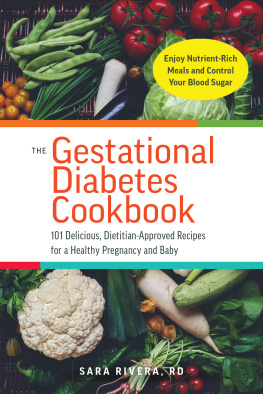
| THE | Gestational
Diabetes
Cookbook 101 Delicious, Dietitian-Approved Recipes for a Healthy Pregnancy and Baby |
SARA RIVERA, RD
Text copyright 2018 Sara Rivera. Design and concept copyright 2018 Ulysses Press and its licensors. All rights reserved. Any unauthorized duplication in whole or in part or dissemination of this edition by any means (including but not limited to photocopying, electronic devices, digital versions, and the internet) will be prosecuted to the fullest extent of the law. Published in the United States by: ULYSSES PRESS P.O. Box 3440 Berkeley, CA 94703 www.ulyssespress.com ISBN: 978-1-61243-883-2 Acquisitions editor: Bridget Thoreson Managing editor: Claire Chun Editor: Renee Rutledge Proofreader: Shayna Keyles Front cover design: Rebecca Lown Interior design: what!design @ whatweb.com Cover photo: ESstock/shutterstock.com NOTE TO READERS: This book has been written and published strictly for informational and educational purposes only.
It is not intended to serve as medical advice or to be any form of medical treatment. You should always consult your physician before altering or changing any aspect of your medical treatment and/or undertaking a diet regimen, including the guidelines as described in this book. Do not stop or change any prescription medications without the guidance and advice of your physician. Any use of the information in this book is made on the readers good judgment after consulting with his or her physician and is the readers sole responsibility. This book is not intended to diagnose or treat any medical condition and is not a substitute for a physician. This book is independently authored and published and no sponsorship or endorsement of this book by, and no affiliation with, any trademarked brands or other products mentioned within is claimed or suggested.
All trademarks that appear in ingredient lists and elsewhere in this book belong to their respective owners and are used here for informational purposes only. The author and publisher encourage readers to patronize the quality brands mentioned and pictured in this book. For Luca, my baby boy. I wrote this book in a very special time of life, the months I carried you. I cant wait to show you the world. Contents Introduction There is never a better time to make health a priority than during your pregnancy.
Even so, no matter how much effort you put into your health, an unexpected condition can develop at any point in the duration of your pregnancy, whether its anemia, preeclampsia, infections, or fetal complications. Some conditions are completely out of your control, but some can be managed through diet and lifestyle changes. One such condition is gestational diabetes mellitus (GDM), or gestational diabetes. While it is one of the most dreaded conditions of pregnancy, fortunately, proper nutrition and lifestyle modifications allow you to manage GDM. GDM, unlike type 1 or type 2 diabetes, can only develop during pregnancy. Gestational diabetes occurs when a pregnant womans blood sugar levels are elevated because the body produces insufficient insulin, the hormone that reduces blood sugar levels.
Uncontrolled blood sugar poses a major risk for mother and baby. Babies of mothers who had uncontrolled blood sugar levels during pregnancy are at a greater risk for developing diabetes and obesity later in life. Babies can also develop an array of complications in the womb if blood sugars are uncontrolled. These factors are usually what motivate women to control their blood sugars through diet, especially during times of cravings. Whether you were diagnosed with GDM in your current pregnancy, were diagnosed with it in a previous pregnancy, or are looking to learn about and prevent GDM, you can benefit from reading this book to educate yourself on how to control blood sugar levels and consume a healthy, varied diet. The key to managing GDM is to learn about the healthy foods to consume for you and baby, as well as the foods to limit your intake of.
Carbohydrates are the nutrient that raises blood sugar levels, so its crucial to follow a carbohydrate-controlled diet plan. You do not want to eliminate carbohydrates from your diet, but should rather focus on incorporating the right kinds of carbohydrates, such as high-fiber and unrefined carbohydrates, as well as consuming as the proper portions. This book will teach you how to do both. You will be able to put your new knowledge to use and discover new foods you will love with the 101 recipes this book contains! The overall goal when following a carbohydrate-controlled diet is to provide enough nutrients to support your hard-at-work body and meet the needs of your growing baby, all while being mindful to maintain proper blood sugar levels. To do this, your meal plan should consist of small, frequent meals throughout the day. This may sound complicated at first, but after reading the facts and details on GDM and learning how to put together a balanced plate, it will become second nature.
This book will provide background information on what GDM is, including symptoms, causes, and risk factors; complications of gestational diabetes; and a plethora of other useful information. I know you have enough on your plate, whether its balancing pregnancy and working full time or taking care of toddlers, so the meal planning in this book is simple, and youll learn how to put together GDM-friendly meals, read Nutrition Facts labels, and create a healthy grocery shopping list with ease. While GDM is a serious diagnosis and may require medication, sometimes it can be treated naturally with proper nutrition and lifestyle changes alone, if you choose that route. Understanding gestational diabetes and how it affects you and your babys health can allow you to better grasp the direct impact nutrition has on the condition and equip you to make well-informed decisions. By following the nutritional guidelines in this cookbook, as well as the delicious and balanced recipes, you will have the necessary tools to stabilize blood sugar levels while ensuring optimal nutrition for your baby. Right now, make this the start of a healthy journey for your growing family.
CHAPTER ONE What Is Gestational Diabetes? GDM is a common diagnosis for pregnant women. In fact, the Centers for Disease Control and Prevention (CDC) reports the prevalence of GDM among pregnant women is 9.2% and increasing worldwide. Along with the many worries (and joys!) that come with being pregnant, a diagnosis such as GDM can feel crippling. Its important to understand that you likely didnt bring this condition on with your eating habits. In fact, women who are obese or lean can develop gestational diabetes; however, a high body weight is definitely a risk factor for developing GDM. A diagnosis of GDM does not mean you had diabetes prior to pregnancy or that this is a lifelong condition you will have to endure.
GDM, diagnosed in pregnancy, can end after giving birth. GDM is diagnosed when blood sugar, also referred to as blood glucose, is elevated. While the exact cause of GDM is unknown, reduced insulin sensitivity is an identifiable factor. The hormones from the placenta that help the baby develop actually inhibit the mothers insulin from working properly. In other words, the placenta produces hormones that counteract insulin. Insulin, a hormone released by the pancreas, moves glucose into your cells and out of your blood to reduce blood sugar levels.
When insulin is not able to perform its job correctly, blood sugar levels remain elevated. This condition is called insulin resistance, or reduced insulin sensitivity, and it tends to begin midpregnancy and worsen as the pregnancy progresses. This is why the glucose tolerance test, a standard test for GDM conducted by all health-care professionals, is not usually given until between weeks 26 and 28 of pregnancy. (The protocol for the test will be discussed shortly.) Insulin resistance generally disappears directly after giving birth. In normal pregnancies, the body works harder to reduce blood sugar levels, so insulin secretion is increased by 200 to 250%. GDM develops when the body is unable to produce an adequate insulin response to compensate for the hormones counteracting normal insulin resistance.
Next page










 Text copyright 2018 Sara Rivera. Design and concept copyright 2018 Ulysses Press and its licensors. All rights reserved. Any unauthorized duplication in whole or in part or dissemination of this edition by any means (including but not limited to photocopying, electronic devices, digital versions, and the internet) will be prosecuted to the fullest extent of the law. Published in the United States by: ULYSSES PRESS P.O. Box 3440 Berkeley, CA 94703 www.ulyssespress.com ISBN: 978-1-61243-883-2 Acquisitions editor: Bridget Thoreson Managing editor: Claire Chun Editor: Renee Rutledge Proofreader: Shayna Keyles Front cover design: Rebecca Lown Interior design: what!design @ whatweb.com Cover photo: ESstock/shutterstock.com NOTE TO READERS: This book has been written and published strictly for informational and educational purposes only.
Text copyright 2018 Sara Rivera. Design and concept copyright 2018 Ulysses Press and its licensors. All rights reserved. Any unauthorized duplication in whole or in part or dissemination of this edition by any means (including but not limited to photocopying, electronic devices, digital versions, and the internet) will be prosecuted to the fullest extent of the law. Published in the United States by: ULYSSES PRESS P.O. Box 3440 Berkeley, CA 94703 www.ulyssespress.com ISBN: 978-1-61243-883-2 Acquisitions editor: Bridget Thoreson Managing editor: Claire Chun Editor: Renee Rutledge Proofreader: Shayna Keyles Front cover design: Rebecca Lown Interior design: what!design @ whatweb.com Cover photo: ESstock/shutterstock.com NOTE TO READERS: This book has been written and published strictly for informational and educational purposes only.